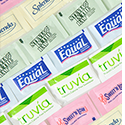Fetal Alcohol Spectrum Disorders More Prevalent Than Expected
The following, reprinted from HealthDay in an article by Tara Haelle, reveals the findings of a study conducted by NRI Researcher Professor Philip May, Ph.D.
 Although drinking during pregnancy has long been considered taboo, new research suggests that as many as one in 20 U.S. children may have health or behavioral problems related to alcohol exposure before birth. The study found that between 2.4 percent and 4.8 percent of children have some kind of fetal alcohol spectrum disorder, or FASD. “Knowing not to drink during pregnancy and not doing so are two different things,” especially before a woman knows she is pregnant, said lead researcher Philip May, a professor of public health at the University of North Carolina Chapel Hill. Findings from the study were reported online October 27 and in the November print issue of Pediatrics. Read more.
Although drinking during pregnancy has long been considered taboo, new research suggests that as many as one in 20 U.S. children may have health or behavioral problems related to alcohol exposure before birth. The study found that between 2.4 percent and 4.8 percent of children have some kind of fetal alcohol spectrum disorder, or FASD. “Knowing not to drink during pregnancy and not doing so are two different things,” especially before a woman knows she is pregnant, said lead researcher Philip May, a professor of public health at the University of North Carolina Chapel Hill. Findings from the study were reported online October 27 and in the November print issue of Pediatrics. Read more.
Carol L. Cheatham, Ph.D. Receives TRIO Award
 On September 9, at Council for Opportunity in Education’s 33rd Annual Conference Gala, Dr. Cheatham was bestowed the 2014 National TRIO Achiever’s Award. The National TRIO Achiever’s Award was created as a tribute to the success and outstanding endeavors of TRIO students and the programs that supported them in their journey to accomplished careers. Dr. Cheatham was part of the Ronald E. McNair Postbaccalaureate Achievement program. The program is designed to encourage first generation and minority undergraduates to consider careers in academia as well as prepare for doctoral study. Dr. Cheatham, center in photo, poses with Zackie Salmon (left) and Susan Stoddard (right), Director and Assistant Director of the McNair Program at the University of Wyoming, who nominated Dr. Cheatham for this award. Read more.
On September 9, at Council for Opportunity in Education’s 33rd Annual Conference Gala, Dr. Cheatham was bestowed the 2014 National TRIO Achiever’s Award. The National TRIO Achiever’s Award was created as a tribute to the success and outstanding endeavors of TRIO students and the programs that supported them in their journey to accomplished careers. Dr. Cheatham was part of the Ronald E. McNair Postbaccalaureate Achievement program. The program is designed to encourage first generation and minority undergraduates to consider careers in academia as well as prepare for doctoral study. Dr. Cheatham, center in photo, poses with Zackie Salmon (left) and Susan Stoddard (right), Director and Assistant Director of the McNair Program at the University of Wyoming, who nominated Dr. Cheatham for this award. Read more.
Research We’re Reading
Artificial Sweetners: New Findings Suggest Negative Health Implications
 As a registered dietitian, I am often asked: “What do you think about artificial sweeteners?” My answer is always the same: “Since they are artificial and not enough research has been conducted to know for certain if they can be harmful, I suggest using them in moderation, learning to drink beverages that are naturally sugar-free, or using regular sugar instead but in moderation.” New research published in the journal Nature indicates a negative impact of artificial sweeteners on the helpful bacteria that live in our intestines. The findings were intriguing and provide one important piece of the puzzle to help better understand the role of these food additives on health. Read more.
As a registered dietitian, I am often asked: “What do you think about artificial sweeteners?” My answer is always the same: “Since they are artificial and not enough research has been conducted to know for certain if they can be harmful, I suggest using them in moderation, learning to drink beverages that are naturally sugar-free, or using regular sugar instead but in moderation.” New research published in the journal Nature indicates a negative impact of artificial sweeteners on the helpful bacteria that live in our intestines. The findings were intriguing and provide one important piece of the puzzle to help better understand the role of these food additives on health. Read more.
A Lasting Holiday Gift
 This year give a holiday gift that plays an essential role in paving the way to a healthier future: create a personalized, engraved brick in Patron’s Plaza at the Nutrition Research Institute. Honor someone special, commemorate an occasion, compose haiku or make a statement. It’s your brick to design. Your tax-deductible gift represents your commitment to the work of NRI scientists in the field of personalized nutrition. Order a brick today to help us find genome-based answers to pressing health issues.
This year give a holiday gift that plays an essential role in paving the way to a healthier future: create a personalized, engraved brick in Patron’s Plaza at the Nutrition Research Institute. Honor someone special, commemorate an occasion, compose haiku or make a statement. It’s your brick to design. Your tax-deductible gift represents your commitment to the work of NRI scientists in the field of personalized nutrition. Order a brick today to help us find genome-based answers to pressing health issues.
Lettuce Eat Fresh Food
 The NRI’s Lettuce Eat Café is open to the public weekdays for breakfast and lunch, offering delicious, fresh gourmet sandwiches, salads and soups plus fresh fruits and sweets. While here visit the pictorial exhibit Kannapolis: From Cotton to Chromosomes in The Scholar’s Cove on the ground level, just around the corner from the café. We invite you to make Lettuce Eat Café your destination for book clubs, coffee groups, business meetings and other gatherings. The facility seats up to 70 people comfortably in a modern, upbeat environment. Menu.
The NRI’s Lettuce Eat Café is open to the public weekdays for breakfast and lunch, offering delicious, fresh gourmet sandwiches, salads and soups plus fresh fruits and sweets. While here visit the pictorial exhibit Kannapolis: From Cotton to Chromosomes in The Scholar’s Cove on the ground level, just around the corner from the café. We invite you to make Lettuce Eat Café your destination for book clubs, coffee groups, business meetings and other gatherings. The facility seats up to 70 people comfortably in a modern, upbeat environment. Menu.
